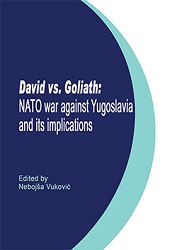THE NATO WAR OF 1999 AND THE IMPOTENCE OF INTERNATIONAL LAW
THE NATO WAR OF 1999 AND THE IMPOTENCE OF INTERNATIONAL LAW
Author(s): Hans Köchler
Subject(s): Law, Constitution, Jurisprudence, International Law, Human Rights and Humanitarian Law, Security and defense, Military policy, Geopolitics
Published by: Институт за међународну политику и привреду
Keywords: use of force; collective security; international rule of law; humanitarian intervention; power politics; United Nations; Security Council
Summary/Abstract: The unilateral use of force by NATO member states against the Federal Republic of Yugoslavia in 1999 has made obvious the flaws of the United Nations system of collective security and has demonstrated the unenforceability of the ban on the use of force in contemporary international law. The concept of “humanitarian intervention” has been proven to be legally invalid, essentially serving as an ideological tool to justify acts for which it is impossible to obtain the Security Council authorization. The dysfunctionality of the Council in the Yugoslavia/Kosovo conflict was further aggravated by a systemic flaw in the UN Charter, namely the provisions of Article 27(3) allowing a permanent member to act as judex in causa sua/ “judge in his own cause,” and to block any collective enforcement action against its own acts of aggression. In terms of international criminal law, the NATO war of 1999 has further exposed the problems of judicial procedures based on Chapter VII resolutions of the Security Council. The (legally invalid) creation of an ad hoc court by virtue of a coercive measure of the Council has meant the politicization of proceedings and a practice of double standards, effectively determined by the most powerful states in the Council at the time. No investigation was ever opened over the war crimes committed by NATO forces in the course of the 1999 war (over which the Yugoslavia Tribunal of the Security Council clearly had jurisdiction). In regard to (state) accountability for acts of aggression as well as (personal) responsibility for the commission of international crimes, the lesson from the NATO war of 1999 is twofold: (a) that international law under the UN system of collective security is impotent, and (b) a unipolar power constellation frequently invites acts of self-help and encourages a policy of faits accomplis. This can only be challenged if a credible balance of power emerges at the global level.
Book: DAVID vs. Goliath : NATO war against Yugoslavia and its implications
- Page Range: 57-71
- Page Count: 15
- Publication Year: 2019
- Language: English
- Content File-PDF

